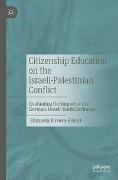Read more
In this book, Elizaveta Firsova-Eckert examines the effects of German-Israeli youth exchange programs on political education processes related to the Middle East conflict. To answer the research question, a mixed-method approach was used to develop a suitable measurement instrument, which was then applied to former participants and interested individuals in the exchange program. The data from this nationwide sample were analyzed using statistical group comparisons to identify potential impacts of the exchange.
The results of the study show positive effects of the youth exchange on many of the examined political education processes. In particular, positive impacts were found regarding the expansion of participants’ conceptual understanding of the Middle East conflict. The study also demonstrates that current events in the Middle East conflict have a significant influence on the political education processes measured.
Elizaveta Firsova-Eckert is a research associate at the Institute for the Didactics of Democracy at Leibniz University Hannover. Her research focuses on impact research, antisemitism studies, and political education regarding the Middle East conflict.
The translation was done with the help of artificial intelligence. A subsequent human revision was done primarily in terms of content
List of contents
Introduction.- Theoretical Background.- State of Research.- Research Questions and Hypotheses.- Development of a Suitable Measurement Instrument.- Methodological Approach in the Main Study.- Results of the Main Study.- Discussion.
About the author
Elizaveta Firsova-Eckert is a research associate at the Institute for the Didactics of Democracy at Leibniz University Hannover. Her research focuses on impact research, antisemitism studies, and political education regarding the Middle East conflict.
Summary
In this book, Elizaveta Firsova-Eckert examines the effects of German-Israeli youth exchange programs on political education processes related to the Middle East conflict. To answer the research question, a mixed-method approach was used to develop a suitable measurement instrument, which was then applied to former participants and interested individuals in the exchange program. The data from this nationwide sample were analyzed using statistical group comparisons to identify potential impacts of the exchange.
The results of the study show positive effects of the youth exchange on many of the examined political education processes. In particular, positive impacts were found regarding the expansion of participants’ conceptual understanding of the Middle East conflict. The study also demonstrates that current events in the Middle East conflict have a significant influence on the political education processes measured.

